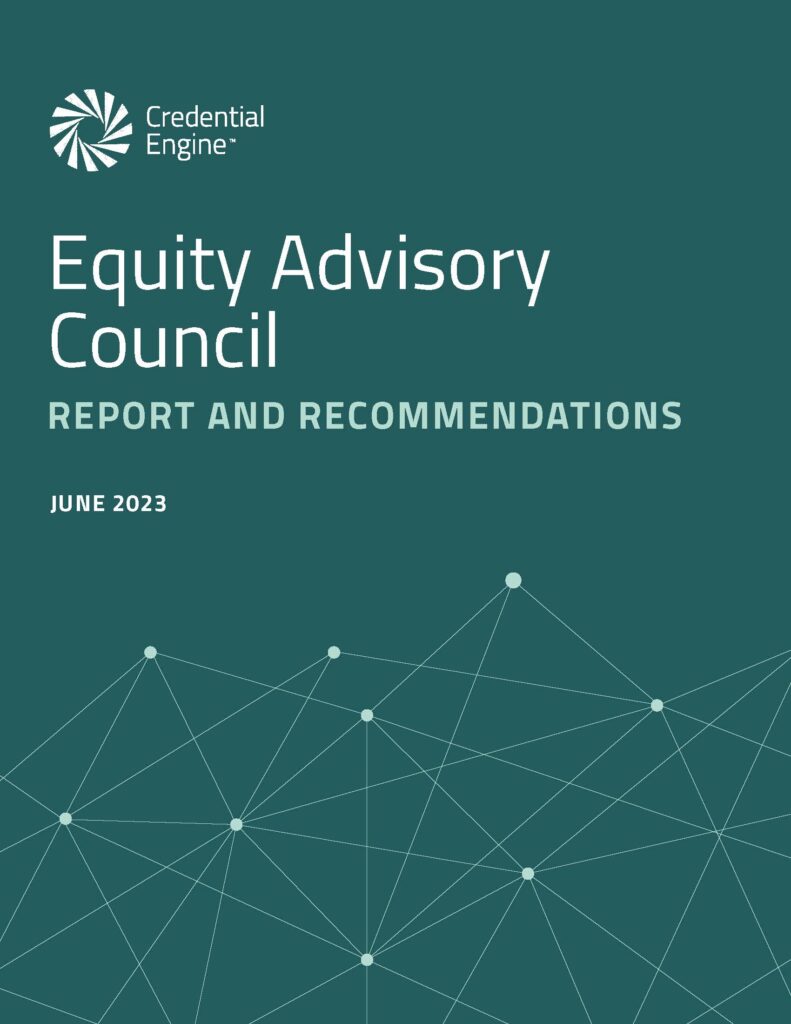Our Commitment to Equity
Credential Engine recognizes that inequities persist in our credentialing ecosystem, often limiting individuals’ opportunities and outcomes in the marketplace, perpetuating persistent disparities. By prioritizing equity, Credential Engine aims to level the playing field and ensure that all individuals, regardless of their background or circumstances, have access to high-quality and transparent information about credentials. Through our resources and tools, Credential Engine empowers students, workers, job seekers, employers, educators, policymakers and others to make informed decisions, navigate education and training pathways, and pursue credentials best aligned with their goals.

Credential Engine’s Equity Advisory Council’s Recommendations on Equity in Credential Data
Evidence demonstrates that the United States’ current education, training and employment systems create particularly burdensome barriers to success for Black, Hispanic/Latino, Asian American and Pacific Islander and Native American students, returning adults, and students from low-income backgrounds. To achieve its vision and dismantle inequities in education and employment access and outcomes, Credential Engine seeks to advance the universal adoption of transparent, open data to give people clear and consistent information that empowers them to find, evaluate and obtain the skills and credentials—and to navigate pathways across those skills and credentials–that maximize the likelihood of equitable outcomes.
Credential Engine’s work is centered around data transparency. Transparent, linked, open data has been identified as a particularly valuable tool for revealing essential information that students, workers, employers and educators can use to make informed decisions about options and pathways. Understanding which credentials and pathways are most likely to lead to equitable outcomes, and then informing and driving change to support them, is one goal of this work.
To support the identification and publishing of key data to aid the navigation of equitable pathways, transfer, and the recognition of learning, Credential Engine convened a broad coalition of equity-focused thought leaders, called the Equity Advisory Council (EAC).
Equity Advisory Council Members:
- Bettina Celis, Maricopa Community Colleges, acting Vice Chancellor and Provost of Academic and Student Affairs
- Kathleen deLaski, Education Design Lab, Founder & Board Chair
- Dhanfu E. Elston, Complete College America, Chief of Staff & Senior Vice President for Strategy
- Ernest Ezeugo, Lumina Foundation, Strategy Officer for Federal Policy
- Linda García, Center for Community College Student Engagement, Executive Director
- Tina Gridiron, ACT Center for Equity in Learning, Vice President
- Debra Humphreys, Lumina Foundation, Vice President of Strategic Engagement
- Richard Irwin, University of Memphis Global, Executive Dean
- Su Jin Gatlin Jez, California Competes, Executive Director
- Alison Kadlec, Sova, Senior Partner and Co-founder
- John Lane, State Higher Education Executive Officers Association, Vice President for Academic Affairs and Equity Initiatives
- Tamera Maresh-Carver, FedEx Express, Managing Director of Development, Innovation & Organizational Strategies
- Elena Quiroz-Livanis, Massachusetts Department of Higher Education, Chief of Staff and Assistant Commissioner for Academic Policy and Student Success
- Robert Ruffins, The Education Trust, Assistant Director, State Advocacy
- Louis Soares, American Council on Education, Chief Learning and Innovation Officer
- David R. Troutman, Texas Higher Education Coordinating Board, Deputy Commissioner for Academic Affairs and Innovation
Equity, as defined by the Equity Advisory Council: “The intentional acknowledgment of, and action to dismantle, systemic barriers that disproportionately affect populations that have been historically and persistently racially minoritized and/or marginalized. In addition to people who experience racial minoritization or discriminatory practices such as ableism, other characteristics of populations that are marginalized include but are not limited to disadvantaged socioeconomic status, age, gender, status as a first-generation college student, populations that are affected by the intersection of these categories, and many others who are not served well by the current education and training systems.”
The Council, along with HCM Strategists, and Credential Engine staff, worked diligently to create a report of recommendations in two related areas:
- The data about credentials, providers, programs, quality, outcomes, pathways and support services that must be made available as linked, open, transparent data in order to support equity, and to help students, workers, and others make their most informed decisions. These data elements are organized into three tiers:
- Tier 1: No Excuses. These are data points that all providers should be able to publish now.
- Tier 2: Time to Stretch. These are data points that all providers should be actively working on being able to analyze and publish.
- Tier 3: Future Forward. These are data points that point to where the field is headed, and providers should be assessing how to build capacity to analyze and publish them.
- Principles for data use that developers of counseling, guidance, navigation and pathways tools and services should follow to ensure that information made open and transparent can bring the greatest value and equity to students and workers. We also encourage those procuring such tools and systems to incorporate these principles into their RFPs and contracts.
The implementation of these recommendations will help meaningfully advance the collective work to bring about a more equitable education and training marketplace through the use of linked, open, interoperable data, like the Credential Transparency Description Language (CTDL). Credential Engine will provide resources and technical support for the publishing and use of these data, and can work with states, systems and districts, schools, colleges and universities, and others for integration into procurement and other policies.
A number of organizations have committed to, or are already publishing many of the Tier 1 data elements highlighted in the report, including Western Governors University (WGU), Southern New Hampshire University (SNHU), Kansas Board of Regents (KBOR), and Indiana Commission for Higher Education.
In addition, a number of entities that provide tools for students, workers, and employers have committed to the data use principles outlined in the report, including Territorium, College Board, and the Learning Economy Foundation.
“We believe that every student needs access to quality information to make informed decisions about their future. College Board supports the recommendations released by Credential Engine’s Equity Advisory Council as a step forward, aimed at better transparency in the discovery and exploration of multiple pathways. When students have increased knowledge about the value of education and career training programs, they are better prepared for life after high school and their future careers.”
The Equity Advisory Council launched in March 2022 with support from the Bill & Melinda Gates Foundation.
Additional Resources are below:
View Related Articles and Blogs Below:
-
“The Power of Data to Promote Equitable Higher Education Pathways” by Paul LeBlanc, President of Southern New Hampshire University (SNHU), and Ted Mitchell, President of the American Council on Education (ACE)
-
“State postsecondary pathways that provide social and economic mobility” by Elena Quiroz-Livanis (EAC Member), David Troutman (EAC Member), and Cristen Moore
-
“Credentials of Value – Equity and Credential Data” by Paul Fain
-
“Here’s what Data Credential Providers Should Publish to Promote Equity” by Laura Spitalniak, the Higher Ed Dive
-
ACT Ready for Work Podcast: Equity and Transparency for Education and Credentials. Hosted by Jasen Jones


